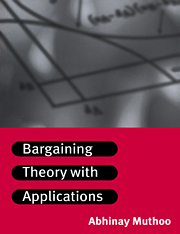11 - Envoi
Published online by Cambridge University Press: 24 November 2009
Summary
Introduction
The theory developed in the preceding chapters contains some fundamental results and insights concerning the role of some key forces on the bargaining outcome. It cannot be overemphasized that the focus of this theory is on the fundamentals. Indeed, in the first stage of the development of an understanding of any phenomenon that is precisely the kind of theory that is required — one that cuts across a wide and rich variety of real-life scenarios and focuses upon their common core elements.
This objective to uncover the fundamentals of bargaining has meant that my study has centred on some basic, elementary, models. That is how it should be. However, it is important that we now move beyond the fundamentals, in order to develop a richer theory of bargaining. With the theory just developed providing appropriate guidance and a firm foundation, it should be possible to construct tractable and richer models that capture more aspects of real-life bargaining situations. At the same time, future research should continue to develop the fundamentals; not only should we further study the roles of the forces studied in this book — especially the study of models in which many such forces are present — but we should also study the role of other forces that have not been addressed in this book (some of which I mention in Section 11.2).
It is worth acknowledging that the role played by the game-theoretic methodology in the development of the theory described in this book has been crucial.
Information
- Type
- Chapter
- Information
- Bargaining Theory with Applications , pp. 333 - 344Publisher: Cambridge University PressPrint publication year: 1999
